Managing People: Team Roles, Theories, and Reflection Report
VerifiedAdded on 2023/01/09
|11
|1718
|73
Report
AI Summary
This report delves into the critical aspects of managing people, focusing on team dynamics and development within a workplace context. The report begins with an introduction and literature review, setting the stage for an exploration of team roles using Belbin's theory (Plant, Monitor, Coordinator, Resource Investigator, Implementer, Completer Finisher, Team Worker, Shaper, Specialists) and Tuckman's stages of team development (Forming, Storming, Norming, Performing, Adjourning). The application of these theories is illustrated through the example of Toyota's marketing and sales teams, and Amazon's cloud, highlighting communication skills, team tasks, and challenges such as role confusion. Furthermore, the report incorporates Kolb's reflection model (Concrete, Reflective, Abstract Conceptualization, Active Experimentation) to emphasize the importance of learning from past experiences for continuous improvement. The conclusion summarizes the key findings, emphasizing the significance of team development and reflection in achieving organizational goals. The report also includes an executive summary and references, providing a comprehensive analysis of team management strategies. Appendices include a personal and professional development plan and a reiteration of Kolb's model.

Managing People
Paraphrase This Document
Need a fresh take? Get an instant paraphrase of this document with our AI Paraphraser

Table of Contents
1. INTRODUCTION............................................................................................................................3
2. Literature review-........................................................................................................................3
3. Application of TEAM roles using theories ( use Belbin & Tuckman) in workplace...................3
4.Kolb's Reflection model...............................................................................................................6
CONCLUSION....................................................................................................................................7
EXECUTIVE SUMMARY..............................................................................................................8
REFERENCES.....................................................................................................................................9
Books & Journal:.............................................................................................................................9
APPENDICIES...................................................................................................................................10
1. INTRODUCTION............................................................................................................................3
2. Literature review-........................................................................................................................3
3. Application of TEAM roles using theories ( use Belbin & Tuckman) in workplace...................3
4.Kolb's Reflection model...............................................................................................................6
CONCLUSION....................................................................................................................................7
EXECUTIVE SUMMARY..............................................................................................................8
REFERENCES.....................................................................................................................................9
Books & Journal:.............................................................................................................................9
APPENDICIES...................................................................................................................................10
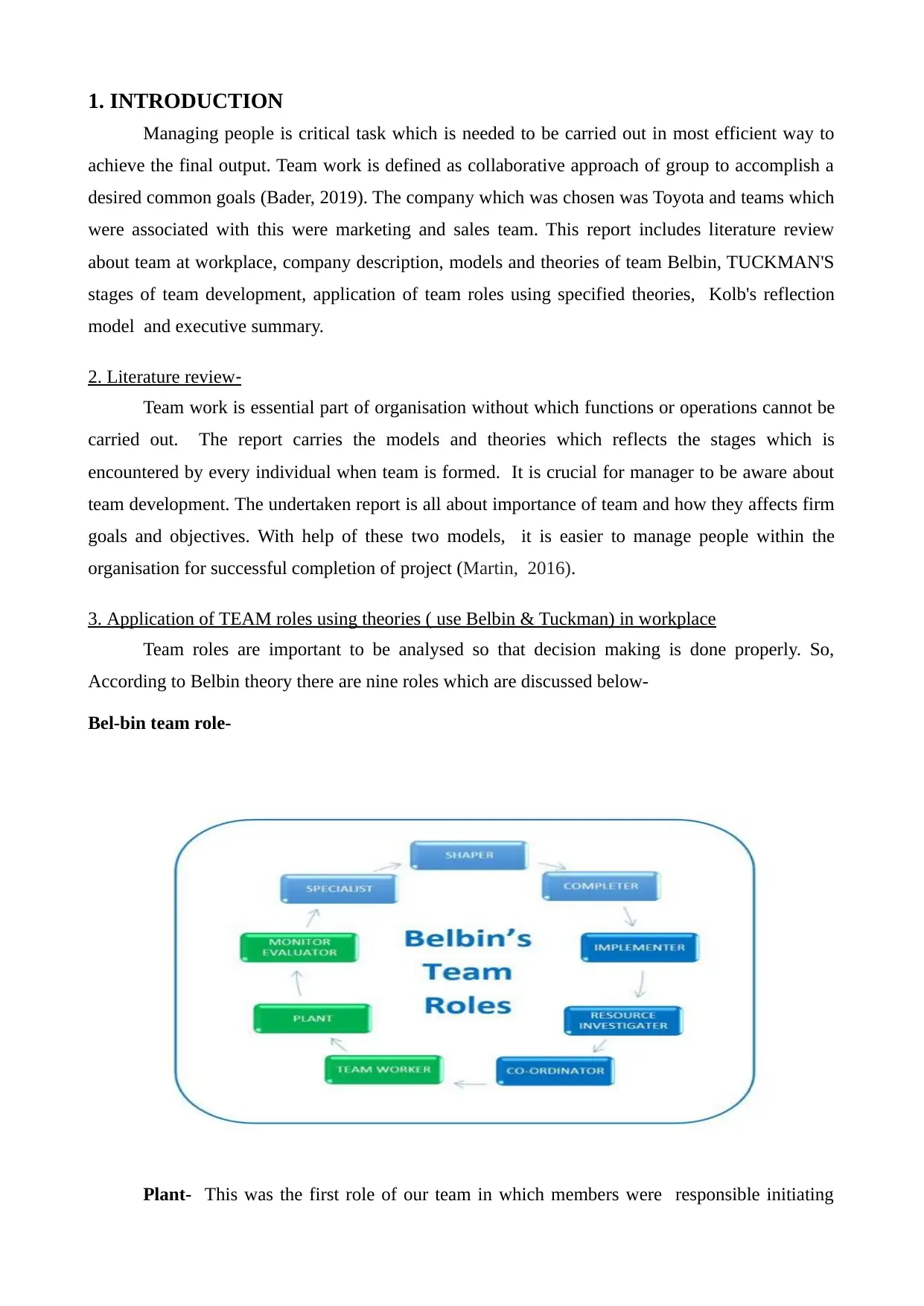
1. INTRODUCTION
Managing people is critical task which is needed to be carried out in most efficient way to
achieve the final output. Team work is defined as collaborative approach of group to accomplish a
desired common goals (Bader, 2019). The company which was chosen was Toyota and teams which
were associated with this were marketing and sales team. This report includes literature review
about team at workplace, company description, models and theories of team Belbin, TUCKMAN'S
stages of team development, application of team roles using specified theories, Kolb's reflection
model and executive summary.
2. Literature review-
Team work is essential part of organisation without which functions or operations cannot be
carried out. The report carries the models and theories which reflects the stages which is
encountered by every individual when team is formed. It is crucial for manager to be aware about
team development. The undertaken report is all about importance of team and how they affects firm
goals and objectives. With help of these two models, it is easier to manage people within the
organisation for successful completion of project (Martin, 2016).
3. Application of TEAM roles using theories ( use Belbin & Tuckman) in workplace
Team roles are important to be analysed so that decision making is done properly. So,
According to Belbin theory there are nine roles which are discussed below-
Bel-bin team role-
Plant- This was the first role of our team in which members were responsible initiating
Managing people is critical task which is needed to be carried out in most efficient way to
achieve the final output. Team work is defined as collaborative approach of group to accomplish a
desired common goals (Bader, 2019). The company which was chosen was Toyota and teams which
were associated with this were marketing and sales team. This report includes literature review
about team at workplace, company description, models and theories of team Belbin, TUCKMAN'S
stages of team development, application of team roles using specified theories, Kolb's reflection
model and executive summary.
2. Literature review-
Team work is essential part of organisation without which functions or operations cannot be
carried out. The report carries the models and theories which reflects the stages which is
encountered by every individual when team is formed. It is crucial for manager to be aware about
team development. The undertaken report is all about importance of team and how they affects firm
goals and objectives. With help of these two models, it is easier to manage people within the
organisation for successful completion of project (Martin, 2016).
3. Application of TEAM roles using theories ( use Belbin & Tuckman) in workplace
Team roles are important to be analysed so that decision making is done properly. So,
According to Belbin theory there are nine roles which are discussed below-
Bel-bin team role-
Plant- This was the first role of our team in which members were responsible initiating
⊘ This is a preview!⊘
Do you want full access?
Subscribe today to unlock all pages.

Trusted by 1+ million students worldwide
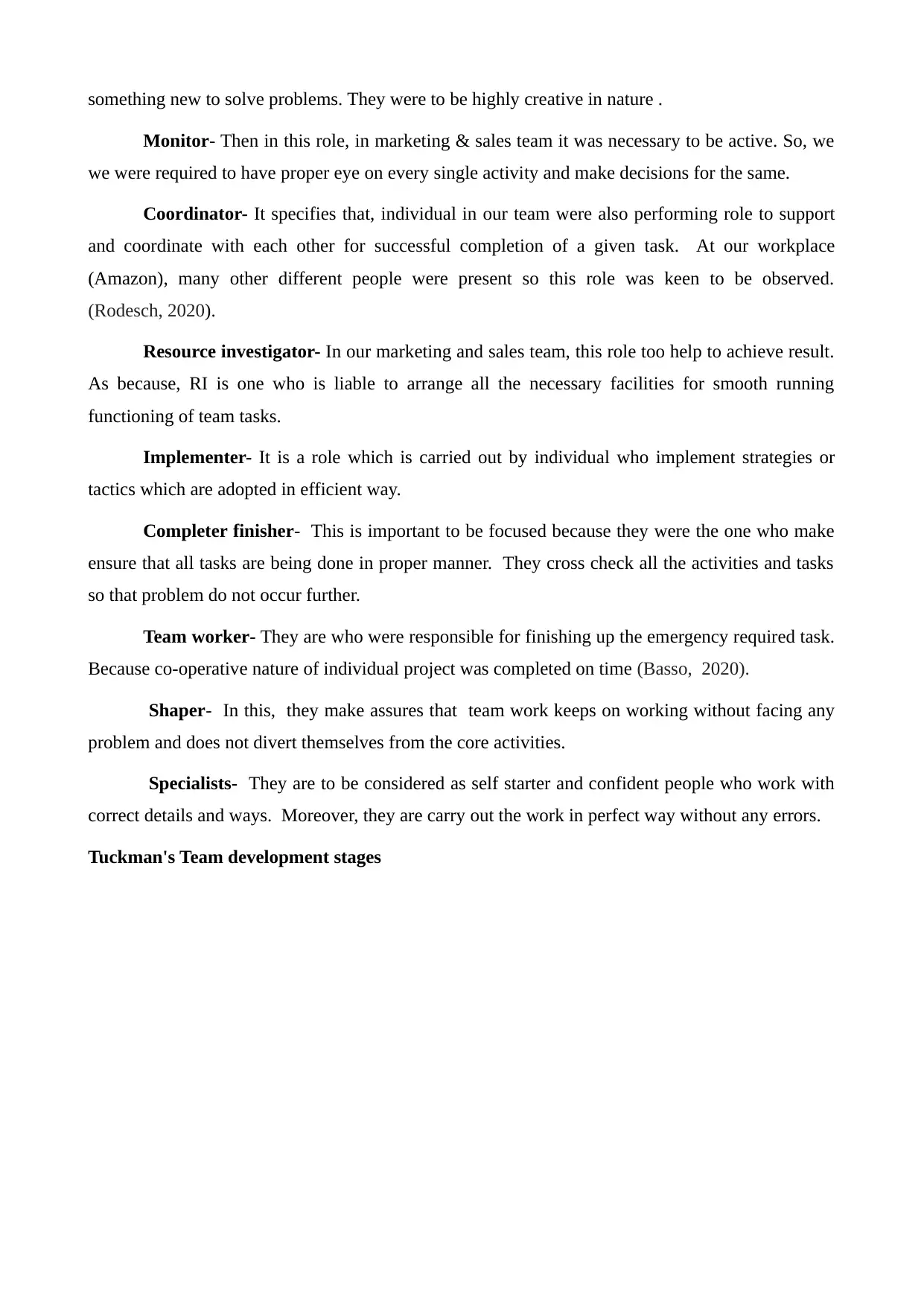
something new to solve problems. They were to be highly creative in nature .
Monitor- Then in this role, in marketing & sales team it was necessary to be active. So, we
we were required to have proper eye on every single activity and make decisions for the same.
Coordinator- It specifies that, individual in our team were also performing role to support
and coordinate with each other for successful completion of a given task. At our workplace
(Amazon), many other different people were present so this role was keen to be observed.
(Rodesch, 2020).
Resource investigator- In our marketing and sales team, this role too help to achieve result.
As because, RI is one who is liable to arrange all the necessary facilities for smooth running
functioning of team tasks.
Implementer- It is a role which is carried out by individual who implement strategies or
tactics which are adopted in efficient way.
Completer finisher- This is important to be focused because they were the one who make
ensure that all tasks are being done in proper manner. They cross check all the activities and tasks
so that problem do not occur further.
Team worker- They are who were responsible for finishing up the emergency required task.
Because co-operative nature of individual project was completed on time (Basso, 2020).
Shaper- In this, they make assures that team work keeps on working without facing any
problem and does not divert themselves from the core activities.
Specialists- They are to be considered as self starter and confident people who work with
correct details and ways. Moreover, they are carry out the work in perfect way without any errors.
Tuckman's Team development stages
Monitor- Then in this role, in marketing & sales team it was necessary to be active. So, we
we were required to have proper eye on every single activity and make decisions for the same.
Coordinator- It specifies that, individual in our team were also performing role to support
and coordinate with each other for successful completion of a given task. At our workplace
(Amazon), many other different people were present so this role was keen to be observed.
(Rodesch, 2020).
Resource investigator- In our marketing and sales team, this role too help to achieve result.
As because, RI is one who is liable to arrange all the necessary facilities for smooth running
functioning of team tasks.
Implementer- It is a role which is carried out by individual who implement strategies or
tactics which are adopted in efficient way.
Completer finisher- This is important to be focused because they were the one who make
ensure that all tasks are being done in proper manner. They cross check all the activities and tasks
so that problem do not occur further.
Team worker- They are who were responsible for finishing up the emergency required task.
Because co-operative nature of individual project was completed on time (Basso, 2020).
Shaper- In this, they make assures that team work keeps on working without facing any
problem and does not divert themselves from the core activities.
Specialists- They are to be considered as self starter and confident people who work with
correct details and ways. Moreover, they are carry out the work in perfect way without any errors.
Tuckman's Team development stages
Paraphrase This Document
Need a fresh take? Get an instant paraphrase of this document with our AI Paraphraser
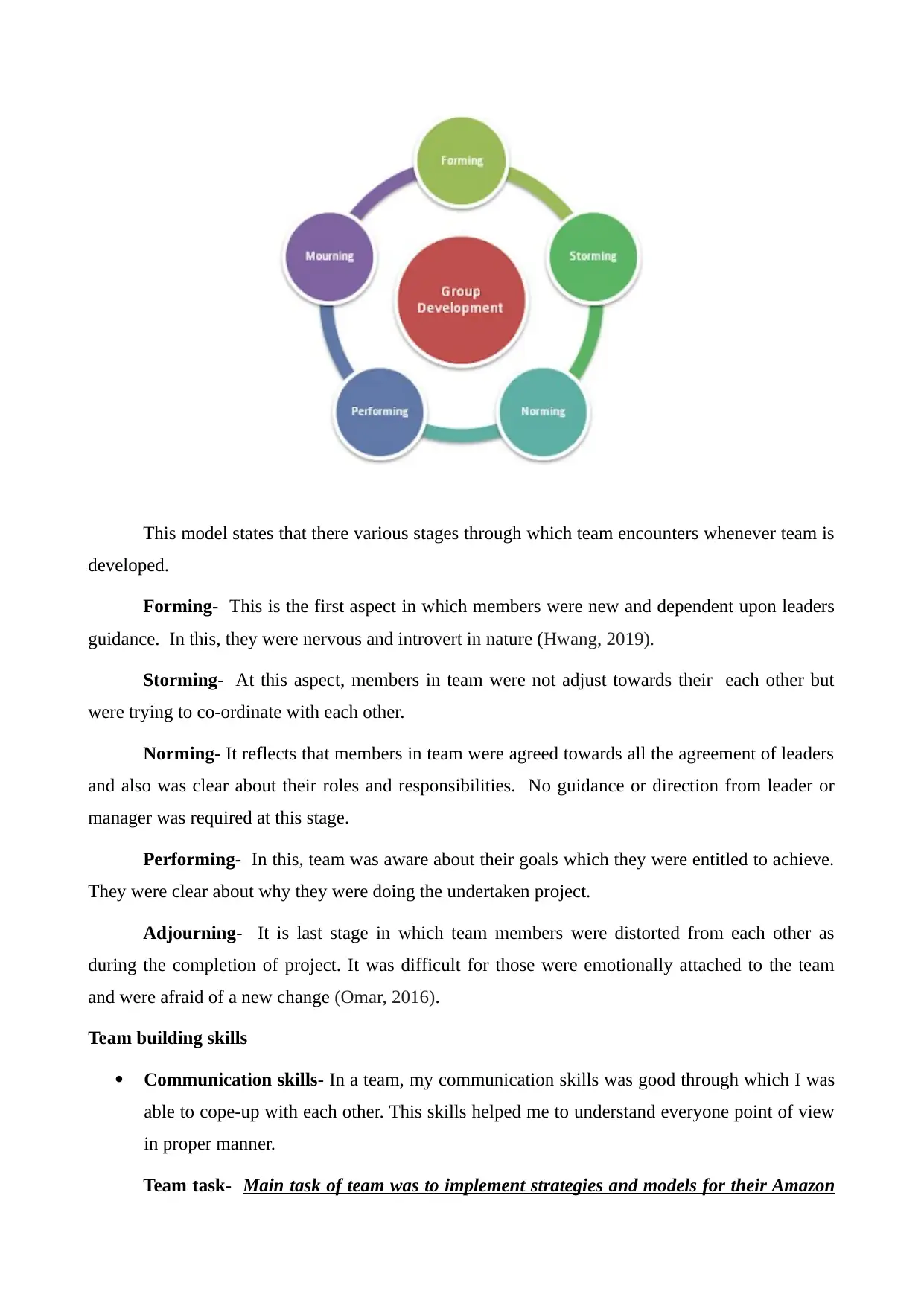
This model states that there various stages through which team encounters whenever team is
developed.
Forming- This is the first aspect in which members were new and dependent upon leaders
guidance. In this, they were nervous and introvert in nature (Hwang, 2019).
Storming- At this aspect, members in team were not adjust towards their each other but
were trying to co-ordinate with each other.
Norming- It reflects that members in team were agreed towards all the agreement of leaders
and also was clear about their roles and responsibilities. No guidance or direction from leader or
manager was required at this stage.
Performing- In this, team was aware about their goals which they were entitled to achieve.
They were clear about why they were doing the undertaken project.
Adjourning- It is last stage in which team members were distorted from each other as
during the completion of project. It was difficult for those were emotionally attached to the team
and were afraid of a new change (Omar, 2016).
Team building skills
Communication skills- In a team, my communication skills was good through which I was
able to cope-up with each other. This skills helped me to understand everyone point of view
in proper manner.
Team task- Main task of team was to implement strategies and models for their Amazon
developed.
Forming- This is the first aspect in which members were new and dependent upon leaders
guidance. In this, they were nervous and introvert in nature (Hwang, 2019).
Storming- At this aspect, members in team were not adjust towards their each other but
were trying to co-ordinate with each other.
Norming- It reflects that members in team were agreed towards all the agreement of leaders
and also was clear about their roles and responsibilities. No guidance or direction from leader or
manager was required at this stage.
Performing- In this, team was aware about their goals which they were entitled to achieve.
They were clear about why they were doing the undertaken project.
Adjourning- It is last stage in which team members were distorted from each other as
during the completion of project. It was difficult for those were emotionally attached to the team
and were afraid of a new change (Omar, 2016).
Team building skills
Communication skills- In a team, my communication skills was good through which I was
able to cope-up with each other. This skills helped me to understand everyone point of view
in proper manner.
Team task- Main task of team was to implement strategies and models for their Amazon
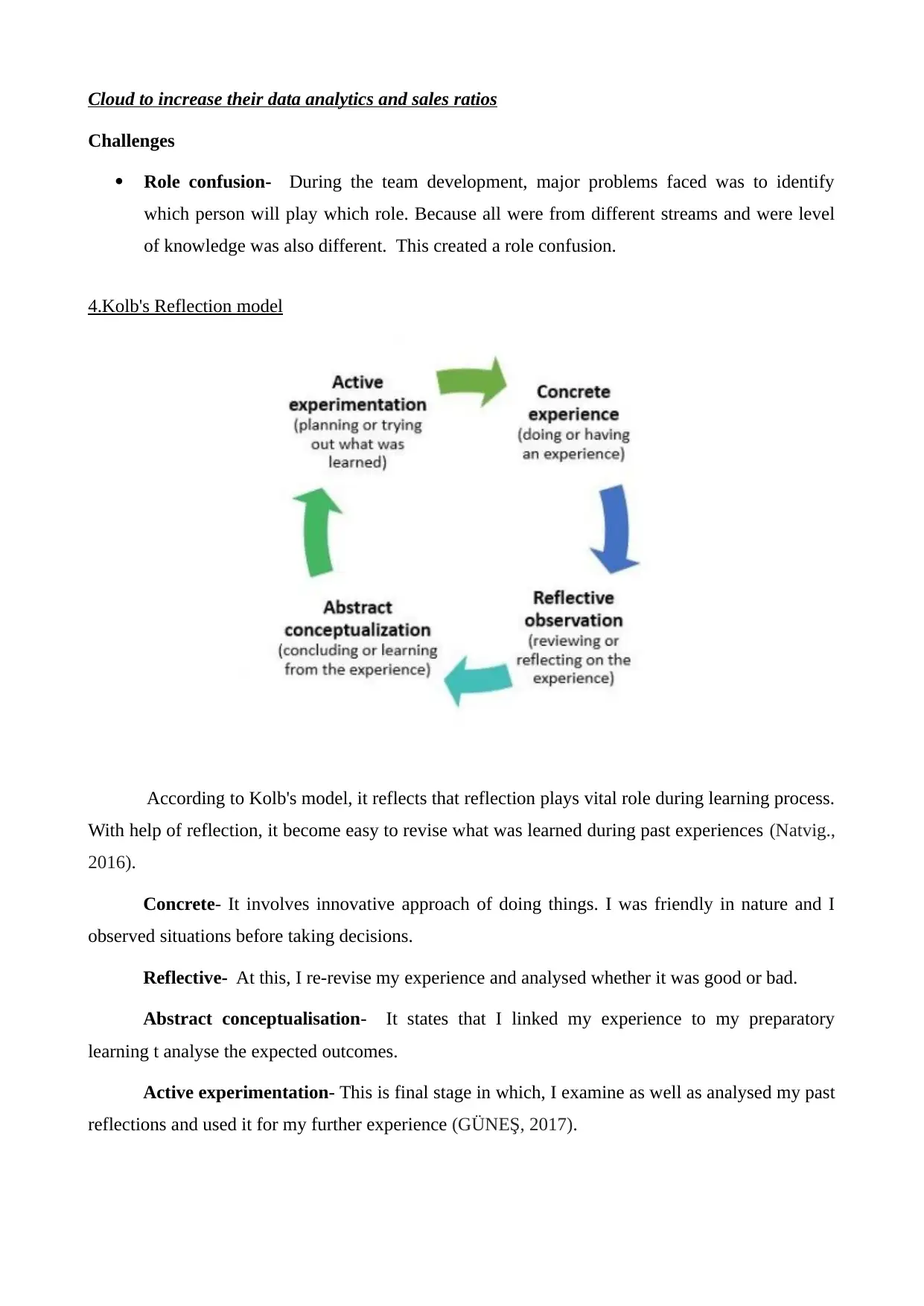
Cloud to increase their data analytics and sales ratios
Challenges
Role confusion- During the team development, major problems faced was to identify
which person will play which role. Because all were from different streams and were level
of knowledge was also different. This created a role confusion.
4.Kolb's Reflection model
According to Kolb's model, it reflects that reflection plays vital role during learning process.
With help of reflection, it become easy to revise what was learned during past experiences (Natvig.,
2016).
Concrete- It involves innovative approach of doing things. I was friendly in nature and I
observed situations before taking decisions.
Reflective- At this, I re-revise my experience and analysed whether it was good or bad.
Abstract conceptualisation- It states that I linked my experience to my preparatory
learning t analyse the expected outcomes.
Active experimentation- This is final stage in which, I examine as well as analysed my past
reflections and used it for my further experience (GÜNEŞ, 2017).
Challenges
Role confusion- During the team development, major problems faced was to identify
which person will play which role. Because all were from different streams and were level
of knowledge was also different. This created a role confusion.
4.Kolb's Reflection model
According to Kolb's model, it reflects that reflection plays vital role during learning process.
With help of reflection, it become easy to revise what was learned during past experiences (Natvig.,
2016).
Concrete- It involves innovative approach of doing things. I was friendly in nature and I
observed situations before taking decisions.
Reflective- At this, I re-revise my experience and analysed whether it was good or bad.
Abstract conceptualisation- It states that I linked my experience to my preparatory
learning t analyse the expected outcomes.
Active experimentation- This is final stage in which, I examine as well as analysed my past
reflections and used it for my further experience (GÜNEŞ, 2017).
⊘ This is a preview!⊘
Do you want full access?
Subscribe today to unlock all pages.

Trusted by 1+ million students worldwide
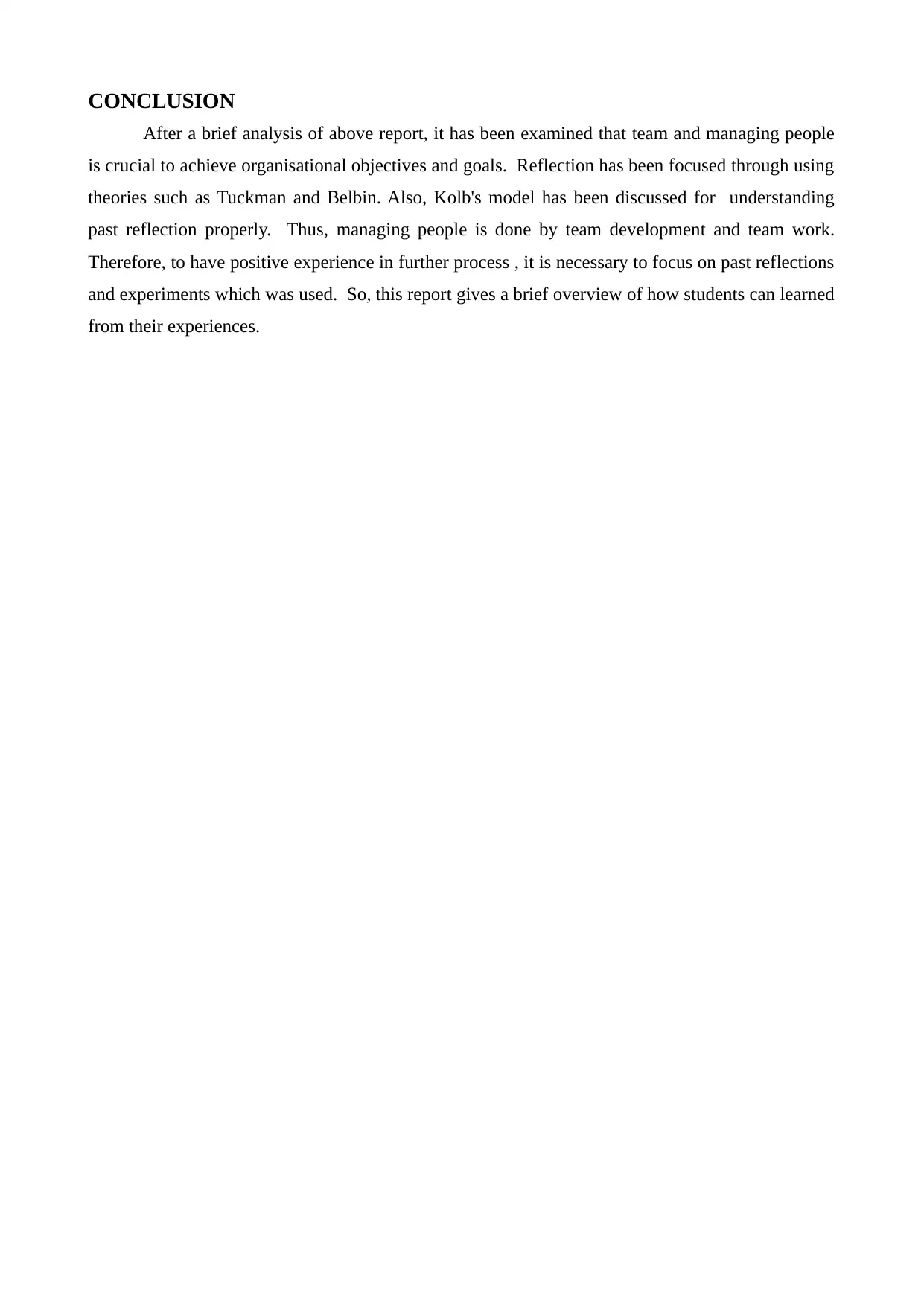
CONCLUSION
After a brief analysis of above report, it has been examined that team and managing people
is crucial to achieve organisational objectives and goals. Reflection has been focused through using
theories such as Tuckman and Belbin. Also, Kolb's model has been discussed for understanding
past reflection properly. Thus, managing people is done by team development and team work.
Therefore, to have positive experience in further process , it is necessary to focus on past reflections
and experiments which was used. So, this report gives a brief overview of how students can learned
from their experiences.
After a brief analysis of above report, it has been examined that team and managing people
is crucial to achieve organisational objectives and goals. Reflection has been focused through using
theories such as Tuckman and Belbin. Also, Kolb's model has been discussed for understanding
past reflection properly. Thus, managing people is done by team development and team work.
Therefore, to have positive experience in further process , it is necessary to focus on past reflections
and experiments which was used. So, this report gives a brief overview of how students can learned
from their experiences.
Paraphrase This Document
Need a fresh take? Get an instant paraphrase of this document with our AI Paraphraser
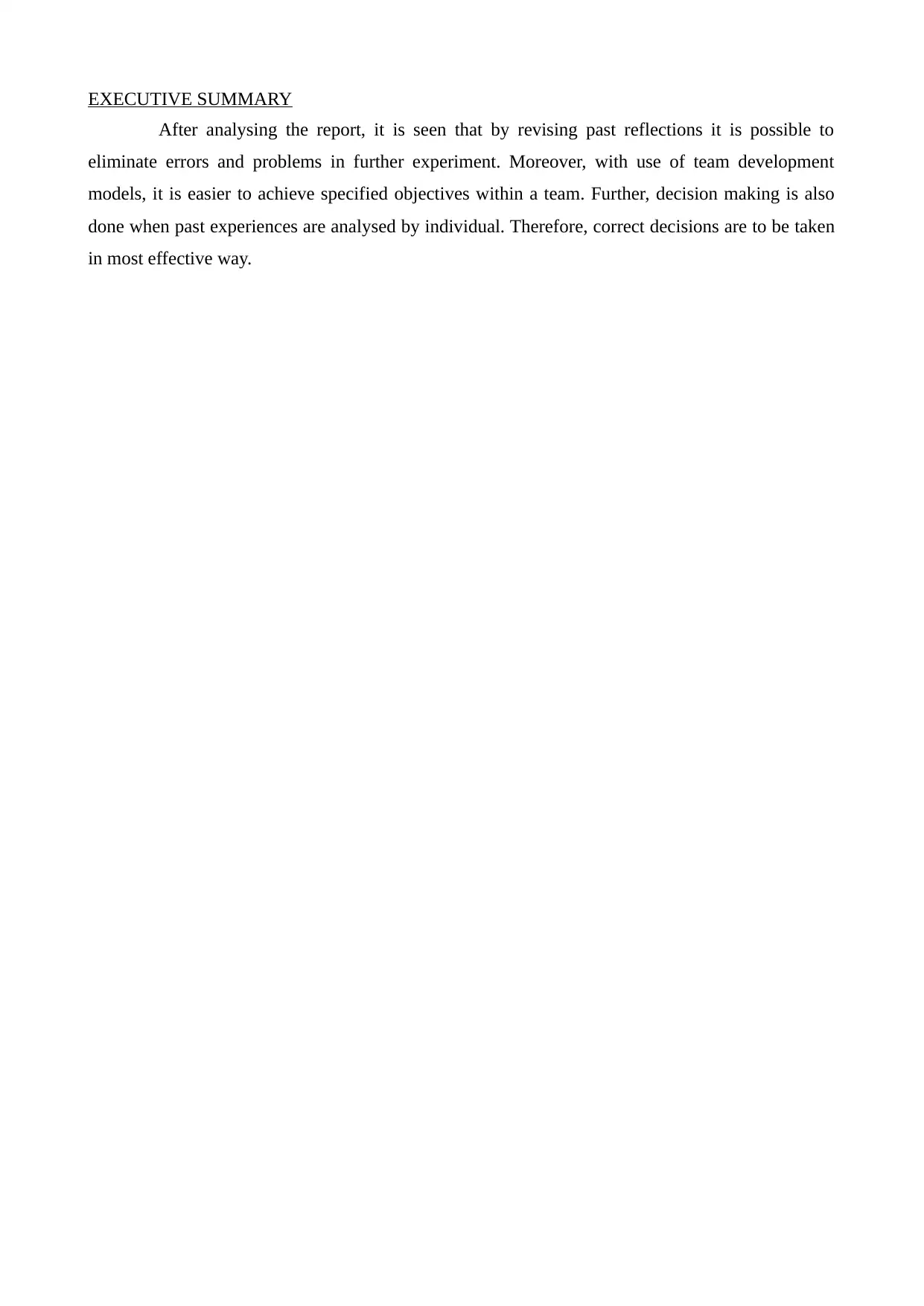
EXECUTIVE SUMMARY
After analysing the report, it is seen that by revising past reflections it is possible to
eliminate errors and problems in further experiment. Moreover, with use of team development
models, it is easier to achieve specified objectives within a team. Further, decision making is also
done when past experiences are analysed by individual. Therefore, correct decisions are to be taken
in most effective way.
After analysing the report, it is seen that by revising past reflections it is possible to
eliminate errors and problems in further experiment. Moreover, with use of team development
models, it is easier to achieve specified objectives within a team. Further, decision making is also
done when past experiences are analysed by individual. Therefore, correct decisions are to be taken
in most effective way.
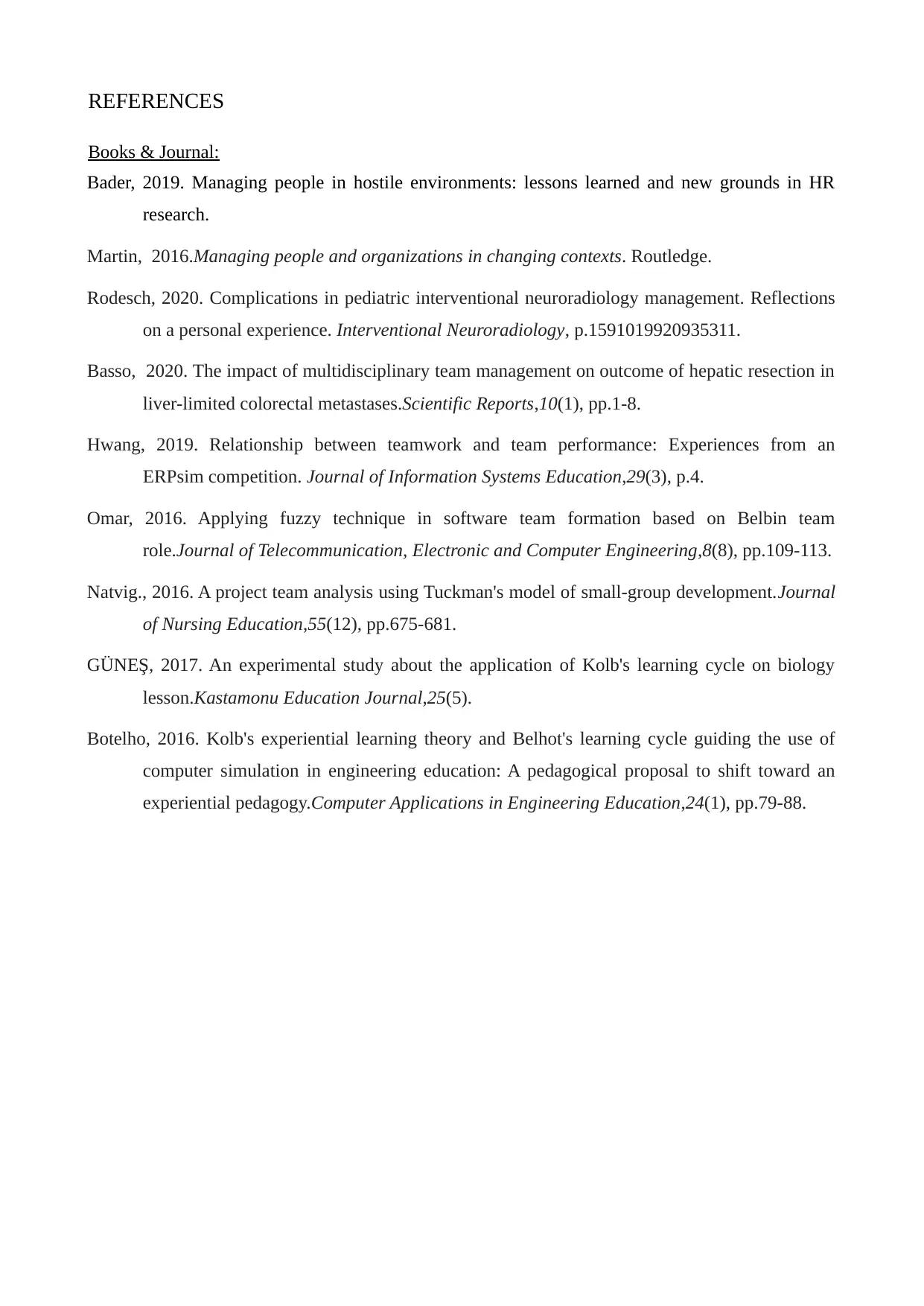
REFERENCES
Books & Journal:
Bader, 2019. Managing people in hostile environments: lessons learned and new grounds in HR
research.
Martin, 2016.Managing people and organizations in changing contexts. Routledge.
Rodesch, 2020. Complications in pediatric interventional neuroradiology management. Reflections
on a personal experience. Interventional Neuroradiology, p.1591019920935311.
Basso, 2020. The impact of multidisciplinary team management on outcome of hepatic resection in
liver-limited colorectal metastases.Scientific Reports,10(1), pp.1-8.
Hwang, 2019. Relationship between teamwork and team performance: Experiences from an
ERPsim competition. Journal of Information Systems Education,29(3), p.4.
Omar, 2016. Applying fuzzy technique in software team formation based on Belbin team
role.Journal of Telecommunication, Electronic and Computer Engineering,8(8), pp.109-113.
Natvig., 2016. A project team analysis using Tuckman's model of small-group development.Journal
of Nursing Education,55(12), pp.675-681.
GÜNEŞ, 2017. An experimental study about the application of Kolb's learning cycle on biology
lesson.Kastamonu Education Journal,25(5).
Botelho, 2016. Kolb's experiential learning theory and Belhot's learning cycle guiding the use of
computer simulation in engineering education: A pedagogical proposal to shift toward an
experiential pedagogy.Computer Applications in Engineering Education,24(1), pp.79-88.
Books & Journal:
Bader, 2019. Managing people in hostile environments: lessons learned and new grounds in HR
research.
Martin, 2016.Managing people and organizations in changing contexts. Routledge.
Rodesch, 2020. Complications in pediatric interventional neuroradiology management. Reflections
on a personal experience. Interventional Neuroradiology, p.1591019920935311.
Basso, 2020. The impact of multidisciplinary team management on outcome of hepatic resection in
liver-limited colorectal metastases.Scientific Reports,10(1), pp.1-8.
Hwang, 2019. Relationship between teamwork and team performance: Experiences from an
ERPsim competition. Journal of Information Systems Education,29(3), p.4.
Omar, 2016. Applying fuzzy technique in software team formation based on Belbin team
role.Journal of Telecommunication, Electronic and Computer Engineering,8(8), pp.109-113.
Natvig., 2016. A project team analysis using Tuckman's model of small-group development.Journal
of Nursing Education,55(12), pp.675-681.
GÜNEŞ, 2017. An experimental study about the application of Kolb's learning cycle on biology
lesson.Kastamonu Education Journal,25(5).
Botelho, 2016. Kolb's experiential learning theory and Belhot's learning cycle guiding the use of
computer simulation in engineering education: A pedagogical proposal to shift toward an
experiential pedagogy.Computer Applications in Engineering Education,24(1), pp.79-88.
⊘ This is a preview!⊘
Do you want full access?
Subscribe today to unlock all pages.

Trusted by 1+ million students worldwide
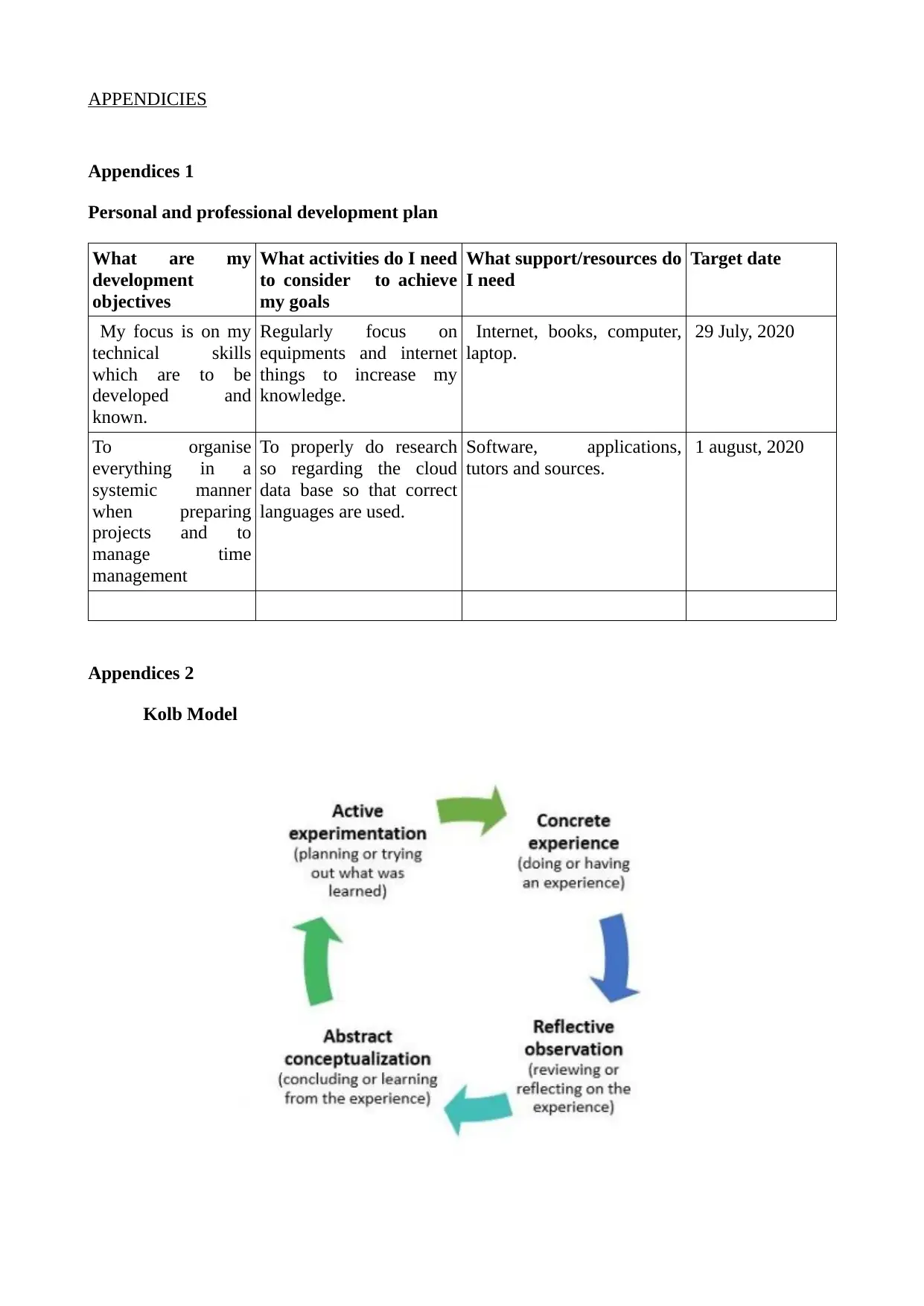
APPENDICIES
Appendices 1
Personal and professional development plan
What are my
development
objectives
What activities do I need
to consider to achieve
my goals
What support/resources do
I need
Target date
My focus is on my
technical skills
which are to be
developed and
known.
Regularly focus on
equipments and internet
things to increase my
knowledge.
Internet, books, computer,
laptop.
29 July, 2020
To organise
everything in a
systemic manner
when preparing
projects and to
manage time
management
To properly do research
so regarding the cloud
data base so that correct
languages are used.
Software, applications,
tutors and sources.
1 august, 2020
Appendices 2
Kolb Model
Appendices 1
Personal and professional development plan
What are my
development
objectives
What activities do I need
to consider to achieve
my goals
What support/resources do
I need
Target date
My focus is on my
technical skills
which are to be
developed and
known.
Regularly focus on
equipments and internet
things to increase my
knowledge.
Internet, books, computer,
laptop.
29 July, 2020
To organise
everything in a
systemic manner
when preparing
projects and to
manage time
management
To properly do research
so regarding the cloud
data base so that correct
languages are used.
Software, applications,
tutors and sources.
1 august, 2020
Appendices 2
Kolb Model
Paraphrase This Document
Need a fresh take? Get an instant paraphrase of this document with our AI Paraphraser
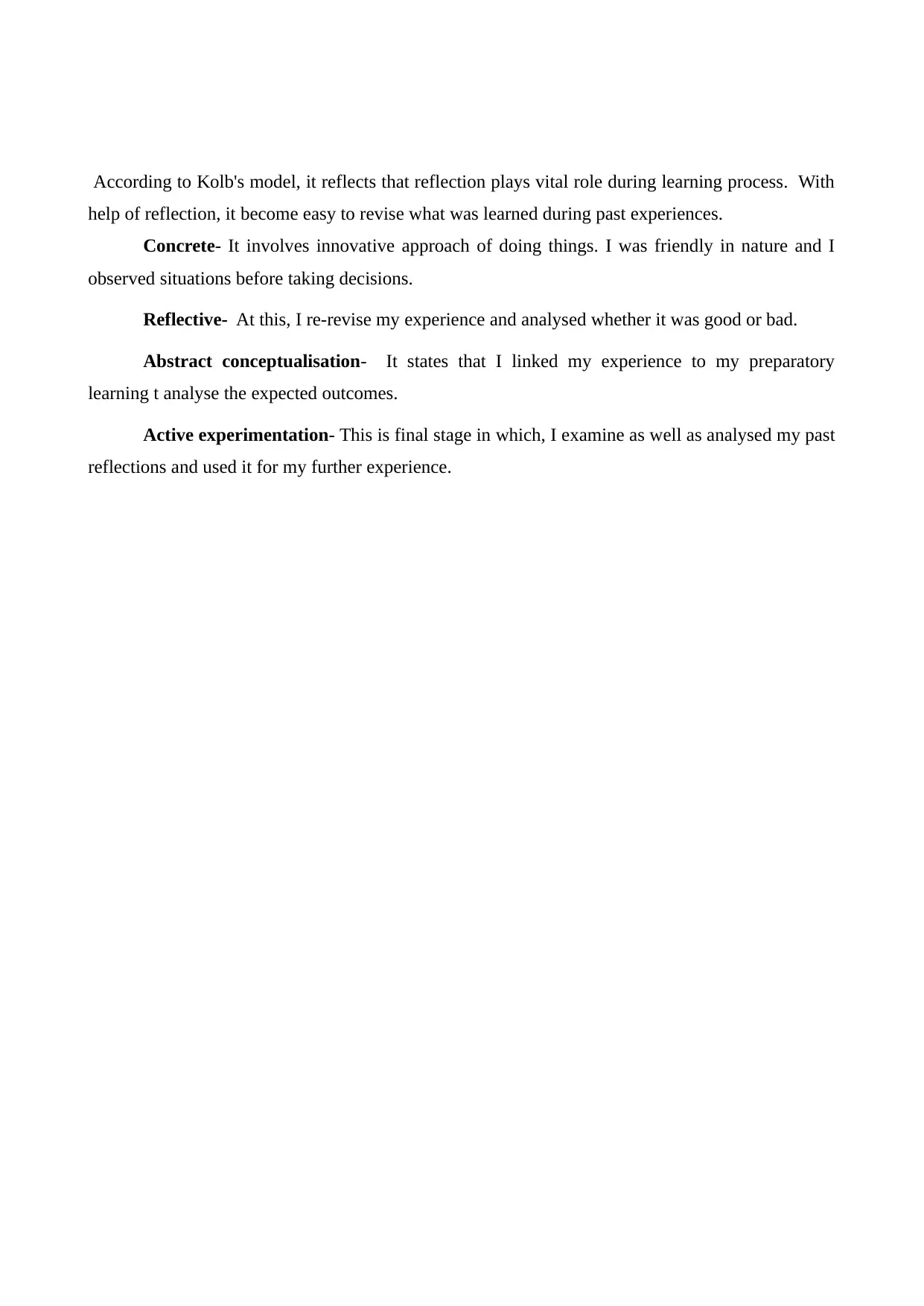
According to Kolb's model, it reflects that reflection plays vital role during learning process. With
help of reflection, it become easy to revise what was learned during past experiences.
Concrete- It involves innovative approach of doing things. I was friendly in nature and I
observed situations before taking decisions.
Reflective- At this, I re-revise my experience and analysed whether it was good or bad.
Abstract conceptualisation- It states that I linked my experience to my preparatory
learning t analyse the expected outcomes.
Active experimentation- This is final stage in which, I examine as well as analysed my past
reflections and used it for my further experience.
help of reflection, it become easy to revise what was learned during past experiences.
Concrete- It involves innovative approach of doing things. I was friendly in nature and I
observed situations before taking decisions.
Reflective- At this, I re-revise my experience and analysed whether it was good or bad.
Abstract conceptualisation- It states that I linked my experience to my preparatory
learning t analyse the expected outcomes.
Active experimentation- This is final stage in which, I examine as well as analysed my past
reflections and used it for my further experience.
1 out of 11
Related Documents
Your All-in-One AI-Powered Toolkit for Academic Success.
+13062052269
info@desklib.com
Available 24*7 on WhatsApp / Email
![[object Object]](/_next/static/media/star-bottom.7253800d.svg)
Unlock your academic potential
Copyright © 2020–2026 A2Z Services. All Rights Reserved. Developed and managed by ZUCOL.





